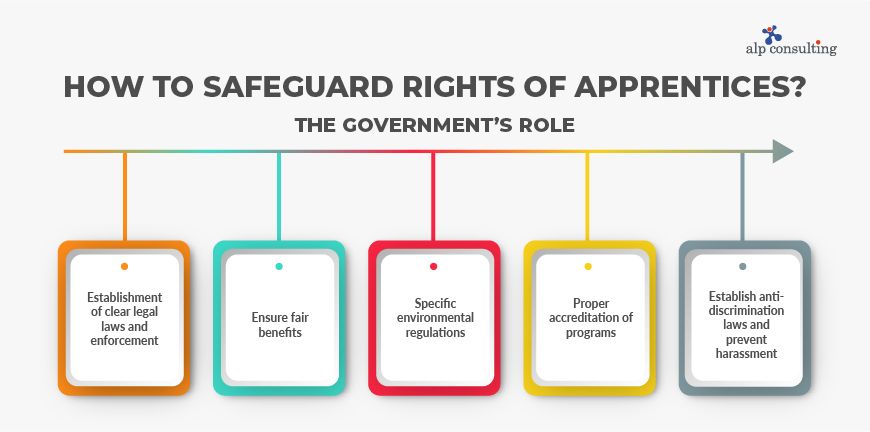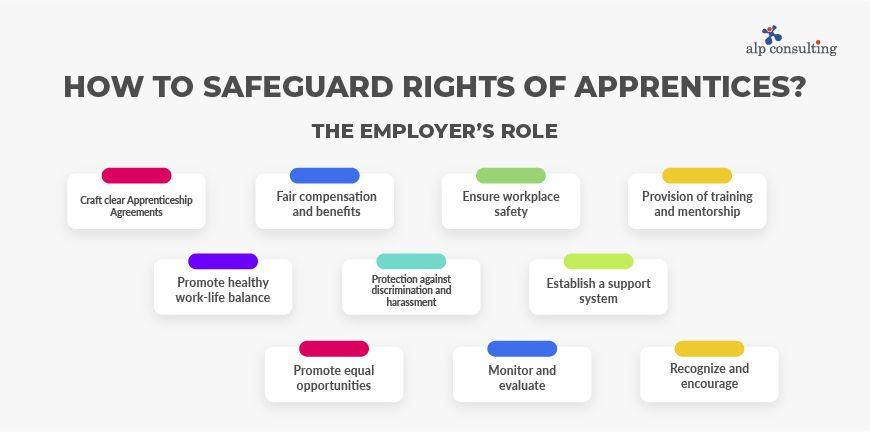
The State of the Quick-Commerce Space in India and What to Expect in the Future
27/06/2024
What is Patient Advocacy and Why Is It Important?
02/07/2024Apprentices are not just your employees; they are primarily your students, and you as their teacher/employer have a moral obligation to ensure they learn the trade well enough to become full time employees, who can add value to your organization. While it is exciting to welcome young apprentices, protecting their rights and teaching them right is equally important.
Apprenticeships are one of the best ways for organizations to demonstrate their forward thinking. While you may have spent a considerable amount of money and resources on acquiring the right candidates, ensuring they get the most out of the experience is a whole other matter that requires you to follow specific rules and regulations.
Why is it important to protect the rights of apprentices?
Protecting the rights of apprentices isn’t just about educating them about workplace health and safety procedures. It’s important to remember that often, apprentices are just young adults who are vulnerable to abuse and neglect in the workplace. For many, an apprenticeship would be their first-ever workplace environment, where they are treated as professionals and not just students.
Ensuring that their rights are safeguarded will foster a positive and productive environment. You must promote fair treatment and support their development to make sure you create a compliant training program.
How to safeguard the rights of apprentices?
Making sure that apprentices are treated right and have equal access to all resources they need at the workplace is not just a mere obligation but can benefit both the apprentices and the employers in the long run.

However, both the government as well as the employer have a role to play in protecting apprentices’ rights.
The Government’s role
1. Establishment of clear legal laws and enforcement
By developing laws that clearly outline the rights and responsibilities of apprentices and employers, right from setting standards for fair wages to quality of training.
2. Ensure fair benefits
Along with compensation, government must set rules that facilitates fair benefits such as health insurance, paid leave and social security.
3. Specific environmental regulations
Establishment of Occupational and safety and health regulations, as well as frequent inspection of workplaces to ensure their compliance with safety standards.
4. Proper accreditation of programs
Ensure that the apprenticeship programs meet specific standards and are accredited by relevant authorities.
5. Establish anti-discrimination laws and prevent harassment
Apprentices must be protected from discrimination and harassment based on gender, race, religion, or disability, and must be given an equal chance to be part of the program and provided with relevant education and training.
6. Collaborate with stakeholders
An effective collaboration between the government, industry and educational institutions can give rise to an efficient apprenticeship program that’s fair to all apprentices.
Governments have a pivotal role in safeguarding apprentices. By implementing these strategies and fostering collaboration with key stakeholders, governments can create a supportive and equitable system that benefits apprentices and contributes to the development of a skilled and competent workforce.
The Employer’s role
As the ones responsible for the training and well-being of apprentices, employers play a pivotal role in ensuring the safety and development of apprentices. Some of the key strategies they can use to protect apprentices’ rights are-

1. Craft clear Apprenticeship Agreements
Create clear detailed written agreements with apprentices that clearly outline their roles and responsibilities, working hours and other training specifics. Additionally, you must make sure that your apprentices understand all the terms and conditions.
2. Fair compensation and benefits
Apprentices are to be paid fairly as per legal standards and are to be offered competitive wages to attract and retain talent. Provision of benefits such as health insurance and access to employee assistance programs must be in place.
3. Ensure workplace safety
Employers must conduct regular training and safety drills and adhere to all safety and health regulations. This will help eliminate all potential workplace hazards.
4. Provision of training and mentorship
As their employer its your core responsibility to develop comprehensive training programs that can help apprentices acquire practice and theoretical skills required to become professional at their jobs.
5. Promote healthy work-life balance
Abide by labor laws and make sure all your apprentices are only working for reasonable hours. A healthy work-life balance is extremely important for productivity.
6. Protection against discrimination and harassment
Along with the crafting of anti-discrimination and harassment policies you must train your staff and conduct regular training sessions to raise awareness about discrimination, harassment and promote a culture of safety and mutual respect.
7. Establish a support system
Make sure that the apprentices are provided with a point of contact to report any concerns or grievances they are facing. Appoint an HR representative to assist them with their problems and resolve their issues.
8. Promote equal opportunities
Encourage diversity and inclusion and encourage apprentices from different backgrounds and experiences, free of bias. Ensure equal opportunities to all with the right training and help career advancement.
9. Monitor and evaluate
Make sure to conduct regular performance reviews to assess the progress of apprentices and provide them with constructive feedback. Upgrade and modify your apprenticeship program to make sure the apprentices are getting the best out of it.
10. Recognize and encourage
Every individual thrives on positive feedback and encouragement. Have open lines of communication with apprentices and recognize their hard work and small successes to motivate and inspire them to do better.
Conclusion
Safeguarding the rights of apprentices is extremely essential for fostering a fair, supportive, and productive training environment. By implementing comprehensive strategies, both governments and employers can ensure that apprentices protected and supported enough for them to thrive at the workplace. Some of the key measures that must be taken include establishing clear legal frameworks, ensuring fair compensation, maintaining safe working conditions, providing quality training and mentorship, and promoting a culture of respect and inclusion.
Both the government and the employer have an equal role to play in safeguarding and apprentices rights. By collaborating and committing to some of the best practices, it’s possible to create apprenticeship programs that not only protect the rights of apprentices but also enhance their professional development and contribute to a skilled and competent workforce.
Contact Us For Business Enquiry

Suresh Ramkrishna
Suresh Ramkrishna is the Operations Manager at Alp Consulting Ltd., with over 30 years of extensive experience spanning recruitment operations, sourcing, supply chain management, and client relations. At Alp, he leads the Search & Staffing Practice, specializing in bilingual and niche skill hiring while overseeing Japanese language and TITP (Technical Intern Training Program) initiatives. He also manages NAPS (National Apprenticeship Promotion Scheme) training programs, fostering skill development and workforce readiness across industries. Previously, he spent over two decades in the apparel export industry, managing vendor development and international sourcing for top global brands. Suresh’s leadership blends strategic talent acquisition with operational excellence across diverse industries.




